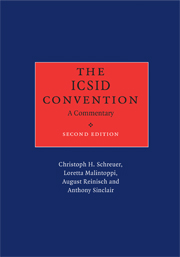Book contents
- Frontmatter
- Contents
- Foreword by Professor Sir Elihu Lauterpacht, CBE, QC
- Authors' preface to the second edition
- Table of cases
- List of abbreviations
- Text of the ICSID Convention
- Procedural calendar
- PREAMBLE
- CHAPTER I International Centre for Settlement of Investment Disputes
- CHAPTER II Jurisdiction of the Centre
- CHAPTER III Conciliation
- CHAPTER IV Arbitration
- CHAPTER V Replacement and Disqualification of Conciliators and Arbitrators
- CHAPTER VI Cost of Proceedings
- CHAPTER VII Place of Proceedings
- Article 62 Proceedings at Seat of Centre
- Article 63 Proceedings at Another Place
- CHAPTER VIII Disputes between Contracting States
- CHAPTER IX Amendment
- CHAPTER X Final Provisions
- Final Clause
- Consolidated bibliography
- Index by article
- Index by subject
Article 63 - Proceedings at Another Place
from CHAPTER VII - Place of Proceedings
Published online by Cambridge University Press: 07 September 2010
- Frontmatter
- Contents
- Foreword by Professor Sir Elihu Lauterpacht, CBE, QC
- Authors' preface to the second edition
- Table of cases
- List of abbreviations
- Text of the ICSID Convention
- Procedural calendar
- PREAMBLE
- CHAPTER I International Centre for Settlement of Investment Disputes
- CHAPTER II Jurisdiction of the Centre
- CHAPTER III Conciliation
- CHAPTER IV Arbitration
- CHAPTER V Replacement and Disqualification of Conciliators and Arbitrators
- CHAPTER VI Cost of Proceedings
- CHAPTER VII Place of Proceedings
- Article 62 Proceedings at Seat of Centre
- Article 63 Proceedings at Another Place
- CHAPTER VIII Disputes between Contracting States
- CHAPTER IX Amendment
- CHAPTER X Final Provisions
- Final Clause
- Consolidated bibliography
- Index by article
- Index by subject
Summary
INTRODUCTION
Art. 63 is the second of two Articles in the Convention's Chapter VII on “Place of Proceedings”. It allows for exceptions to the Rule of Art. 62 that proceedings are to be held at the seat of the Centre. These exceptions are subject to certain conditions. All proceedings away from the Centre's seat are subject to an agreement of the parties. In addition, there must either be an arrangement under Art. 63(a) or an approval by the Commission or the Tribunal after consultation with the Secretary-General under Art. 63(b).
All the drafts to the Convention provided for the conduct of proceedings away from the Centre in terms similar to what eventually became Art. 63 (History, Vol. I, pp. 278–282) (see also para. 4 infra). The debates centred mainly on the types of institutions and the kinds of arrangements that might be suitable for this purpose (see paras. 14, 19 infra) and on whether proceedings might be held in the territory of an interested party (see para. 24 infra).
INTERPRETATION
“Conciliation and arbitration proceedings may be held, if the parties so agree, …”
The conduct of formal proceedings away from the seat of the Centre is contingent upon an agreement of the parties. Art. 63 is one of a number of provisions of the Convention that give the parties discretion in ICSID proceedings. Other examples are Arts. 26, 29, 30, 33, 35, 37, 38, 39, 43, 44, 46, 47, 60 and 61.
- Type
- Chapter
- Information
- The ICSID ConventionA Commentary, pp. 1250 - 1257Publisher: Cambridge University PressPrint publication year: 2009



